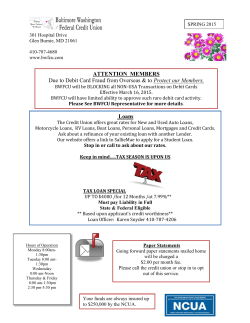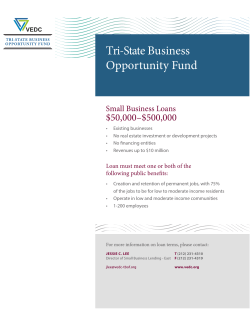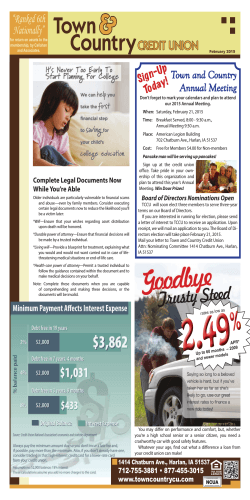
Grad/Law Student Financial Aid at UW-Madison
2015|16 FINANCIAL AID graduate and law Office of Student Financial Aid The Office of Student Financial Aid (OSFA) assists students whose personal and family resources are not adequate to cover the expenses involved in attending the University of Wisconsin–Madison. The office also provides counseling to help students manage their money effectively, information on other potential sources of financial assistance (such as employment), debt management counseling, and small short-term loans for emergency situations. How and When to Apply All aid applicants must fill out the 2015–16 Free Application for Federal Student Aid (FAFSA) at the Department of Education website, www.fafsa.ed.gov. Use UW–Madison’s school code: 003895. If you completed the prior 2014–15 FAFSA, use your federal PIN number to file a Renewal FAFSA from the above website. After we receive your FAFSA we may request other information from you such as your 2014 federal tax return transcript. The best way to check the progress of your aid application is through the Student Center of My UW–Madison at my.wisc.edu. Summer Aid: to apply for summer 2015 financial aid go to My UW–Madison (my.wisc.edu), click on “Student Center” In the “Finances” section, then “View Financial Aid,” select aid year 2016, and click on “Summer Application.” It is best to submit all requested 2015–16 documentation and forms prior to the start of the summer term. You must be enrolled at least half-time in a 4 week session. If you receive a Federal Direct Unsubsidized Loan during the summer it will likely impact the amount you can receive during the academic year. Special Students: Persons enrolled as a university special, school special, or college special does not qualify for federal financial aid, except EDCS and a limited group of students taking prerequisites for graduate school. We will review your classes to determine your aid eligibility for Federal Direct Loan and Federal Work-Study. Contact our office for more information. Note: Financial aid is given on an annual basis. A student must reapply for the FAFSA each year. Your E-mail Address Our office will correspond with you at your “wisc.edu” e-mail address, or at your mailing address if you have no e-mail address. To keep both addresses current, do one of the following: 1. N ew applicants can use their campus ID and PIN to access MyInfo at www.myinfo.wisc.edu. 2. C ontinuing students can use their NetID and password to access My UW-Madison at my.wisc.edu. Your Cost of Attendance Although expenses at UW–Madison will vary among all students, the university bases its decisions regarding financial aid on cost-of-attendance estimates, or “budgets.” Following are the estimated average nine-month costs used for a graduate student for the 2015–16 academic year. Expect an increase in costs d epending on inflation. Graduate NonYour Financial Aid Award Offer Tuition & Fees (estimated) Books & Supplies Room & Board (off campus) Miscellaneous Travel Total Residentresident $11,853 $25,179 1,200 1,200 10,543 10,543 5,0395,039 1,0301,030 $29,665$42,991 Law School Non Tuition & Fees (estimated) Books & Supplies Room & Board (off campus) Miscellaneous Computer Travel Total Residentresident $21,361 $40,057 2,450 2,450 10,543 10,543 5,0395,039 1,0001,000 1,0301,030 $40,423$59,119 Note: 1. Budgets for law and business students will be higher due to the higher cost of tuition, books, and supplies. 2. Residency for tuition purposes is determined by the residence examiner in the Office of the Registrar. Informal opinions by university staff regarding residence status are not official. Your Expected Family Contribution (EFC) It is a basic premise of financial aid programs that the primary responsibility rests with students to pay college expenses. A measure of a student’s financial strength is called the Expected Family Contribution. This includes the prior year’s income, awards, and benefits from agencies outside the university, student (and spouse) assets, fellowships, and other support from the university, such as internships or house fellowships. Note: Our office must be notified by the Graduate School that you have been admitted before your aid application will be processed. Application Completed Before late February Late February through rest of year Expect To Receive Award Offer By Mid-June Several weeks after receipt of entire application Summer applicants should expect to receive an award offer before June 1 if they promptly submit all forms by mid–April. Other Aid You May Be Receiving You are required to notify our office of any outside aid (not awarded by our office) that you might be receiving. This includes, but is not limited to, private and departmental scholarships, fellowships or assistantships. Notify our office as soon as possible concerning the terms and amounts of these awards to prevent having to repay some of your financial aid. Appeals and Special Circumstances If you feel your award does not reflect your current circumstances, it is possible to appeal for reconsideration. Appeals should be submitted in writing to the Office of Student Financial Aid. In general, appeals are successful only when income or expense information changes from a student’s original application. Types of Aid By submitting a financial aid application you will be considered for the following types of aid. Meeting Your Financial Need Federal Work-Study (FWS): This program provides employment either on campus or in a nonprofit off-campus community agency. Amounts students can earn usually range from $500 to about $2,200 per academic year and are based on financial need as determined by the Office of Student Financial Aid and on fund availability. Aid from our office is generally offered in the form of longterm, low-interest loans. High-need students may be offered the option of a work-study job to replace part of the loan or in addition to the loan. Federal Direct Unsubsidized Stafford Loan: This loan is obtained through the federal government. The interest rate is fixed at 6.21% and has an origination fee. The borrower is responsible for interest that accrues while the student is in school. Eligibility is not based on financial need, but the loan amount cannot exceed the difference between the student budget and other aid. Borrowers may receive Direct Unsubsidized Loans up to $20,500 per year. For financial aid purposes, “need” is defined as the d ifference between the cost of attendance as defined by the university and your Expected Family Contribution (EFC) as calculated from the information you provided on your FAFSA. The Office of Student Financial Aid makes every effort to meet your computed financial need; however, in some cases there are not enough funds available to do so, especially for students paying non-resident tuition. You may need to rely on the Direct Graduate PLUS Loan or alternative private student loans to supplement your aid package. Note: More detailed information about these programs will be provided when assistance is actually offered, including (1) the means by which payment of awards will be made, (2) the terms of any loan received and sample repayment schedules, (3) the general conditions and terms applicable to any work-study job (4) the responsibilities involved in accepting a specific type of aid. Student Employment Although work-study positions are limited to students who have been offered Federal Work-Study as part of their financial aid package, there are many other jobs advertised through the UW Student Job Center, 333 East Campus Mall, #9101. Both on- and off-campus job openings are posted daily on the Job Center’s website: http://jobcenter.wisc. edu. These jobs are open to all students and their spouses. In addition, the Memorial Union, Union South, University Hospital and Clinics, University Housing, and campus libraries all hire many student employees each semester. Short-Term Loans Short-term loans are available on a limited basis. These loans are only given to assist in unanticipated emergency situations. All short-term loans must be repaid within the semester in which they are borrowed. To be considered for a short-term loan, you must complete a short-term loan application and submit it in an appointment with a financial aid c ounselor. Law students should apply for short-term loans through the Law School. Financial Counseling Many financial aid questions can be answered by the OSFA front desk staff, but in some cases it is necessary to see a financial aid counselor. Counseling is available to students who want more information about financial aid, employment, personal budgeting, or debt management. Students can see a counselor by appointment in the Office of Student Financial Aid during the regular hours: Monday through Friday, 7:45 a.m. to 4:30 p.m. Other Types of Assistance Following options are other types of aid for which you may be eligible. Application procedures vary for each p rogram. Federal Direct Grad PLUS Loan: Grad PLUS has a fixed rate of 7.21% which begins accruing once the loan is fully disbursed; however, your loan will be placed into deferment while you are enrolled at least half-time and for an additional six months after you cease to be enrolled at least half-time. There is no grace period. There will also be a credit check done before the final approval to determine that the applicant does not have an adverse credit history. This loan can be consolidated with all of your other eligible federal loans if you decide to consolidate after you leave school. You can borrow up to the cost of education minus any other financial aid, but you must apply for the annual maximum eligibility under the Federal Direct Unsubsidized Stafford Loan Program before applying for the Direct Graduate PLUS loan. Private Alternative Loans: These are offered through private lenders and are meant to provide additional aid only after a student has exhausted all other sources of funding, such as Federal Federal Direct Unsubsidized Loans. These loans are not guaranteed by the federal government and may carry high interest rates. They all require credit checks and most will require a co-signer if the borrower has little and/or negative credit history. Visit the OSFA website for a detailed list of private alternative student loans. Assistantships and Fellowships: There are many types of financial assistance available to graduate students through the academic departments, the Law School, and the Graduate School. Eligibility requirements, terms, and amounts vary according to the specific award. Many times recipients are required to work. TAs, PAs, and RAs with one-third appointments receive a full tuition waiver for the appointment term. For other appointments there may be a waiver of the nonresident portion of tuition included as part of the award for nonresident students. Selection may be based on academic excellence, financial need, a combination of these two or other factors. Contact your academic department or the Law School for further information. Often, applicants are required to submit their applications far in advance of their intended enrollment date, so apply as soon as possible. Note: These awards must be taken into consideration when the Office of Student Financial Aid determines your eligibility for federal financial aid. Students with Disabilities: These students could be eligible for tuition and book funding through a grant from the Division of Vocational Rehabilitation (DVR). For further information, visit www.dwd.state.wi.us/dvr. For information regarding disability-related services and programs on the UW–Madison campus, contact the McBurney Disability Resource Center, 702 W. Johnson Street, Suite 2104, Madison, WI 53715, 608–263–2741. Veterans: There may be both long-term loans and monthly G.I. Bill benefits available to veterans to help meet their educational expenses. For further information, contact Student Veteran Services (SVS) at 608-265-4628, [email protected]. Child Care Tuition Assistance Program: Students with children qualify on average for 30–40% of child care costs per academic year. Payments are made directly to the day-care provider. Eligibility is based on financial need, but unlike many other financial aid programs, all students, including special students, those enrolled less than halftime, international students, and others, are potentially eligible. To apply, visit the Office of Child Care and Family Resources at http://occfr.wisc.edu. There are no grant or scholarship funds available to graduate or law students through the Office of Student Financial Aid. There is only loan and work-study assistance. However, the academic departments, the Graduate School, and the Law School are good sources for information about fellowships and assistantships. Eligibility In order to receive loan funds and/or work-study assistance through the Office of Student Financial Aid, a graduate or law student must: n b e a citizen or permanent resident of the United States (international students are not eligible for any aid through the Office of Student Financial Aid); n be admitted as a graduate or law student at UW–Madison; n s how financial need as determined by the Office of Student Financial Aid (except for unsubsidized loans); n m aintain satisfactory academic progress as defined by the Graduate or Law school; n c arry at least a half-time credit load each semester. (4 credits for graduate students, 6 credits for law students); n m eet the specific eligibility requirements for each of the aid programs he or she accepts; n n ot be in default on any federal educational loan, not show an unwillingness to repay any educational loan, and not owe any refund on a federal grant or loan; n have a valid Social Security number; n be in compliance with Selective Service registration; n h ave no convictions for the sale or possession of illegal drugs. Depending on the date of conviction, the student may not be eligible for federal student aid; n n ot be delinquent in court-ordered child support and/ or maintenance (applies to State of Wisconsin controlled grants and scholarships). Generally, the Office of Student Financial Aid will not fund a graduate or law student beyond 10 semesters. This is in addition to aid received as an undergraduate. Summer aid counts as one-half semester. Student Consumer Information n D ata on student retention rates are available from the Office of the Registrar. Website, www.registrar.wisc.edu. n Information on academic programs, faculty, and physical facilities is available in both the UW–Madison Graduate School Catalog or on the Website, www.wisc.edu. n Information regarding university accreditation may be obtained from the Academic Planning and Analysis Office website, apa.wisc.edu. n T he university tuition refund policy for withdrawal from classes is available in the “TuitionGuide,” available online at registrar.wisc.edu. Students with financial aid could be required to return funds to the university. n S tudents who withdraw from the university may have to repay a portion of their aid to the university. The exact amount of the repayment will vary depending on when the withdrawal occurs. Any tuition refund coming to the student will automatically be applied toward the amount that must be repaid. n Criteria used to determine whether a student is maintaining satisfactory academic progress in terms of financial aid eligibility are available in the “Student Award Guide” on our website. In its resolve to create teaching and learning environments that support diversity, UW–Madison will ensure compliance with federal and state laws and campus policies that provide separate prohibitions against discrimination based on race, color, creed, religion, sex, national origin or ancestry, age, or disability. State law additionally prohibits discrimination based on sexual orientation, arrest or conviction record, marital status, pregnancy, parental status, military status, or veteran status. The application of specific state prohibitions on discrimination may be influenced by an individual’s status as an employee or student. Department of Defense personnel policies governing enlistment and commissioning of armed forces personnel and awarding of Reserve Officer Training Corps scholarships to UW– Madison students do discriminate on the basis of sexual orientation. The University of Wisconsin Board of Regents and UW– Madison faculty, staff, and student governance groups have registered their strong opposition to this discrimination and urge the Department of Defense to change its policy. University policies also prohibit harassment on the basis of ethnicity. Inquiries concerning this policy may be directed to the appropriate campus admitting or employing unit or to the Equity and Diversity Resource Center, 179A Bascom Hall, 500 Lincoln Drive, Madison, WI 53706–1380; 608–263–2378; TTY 608–263–2473. The information in this brochure was the most accurate available at the time of publication. It is subject to change at any time without notice. Office of Student Financial Aid University of Wisconsin–Madison 333 East Campus Mall, #9701 Madison, WI 53715–1382 608–262–3060 fax 608–262–9068 E-mail: [email protected] Website: www.finaid.wisc.edu Produced by University Communications Revised April 2015
© Copyright 2026









